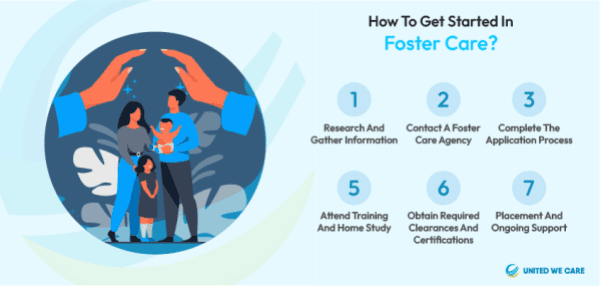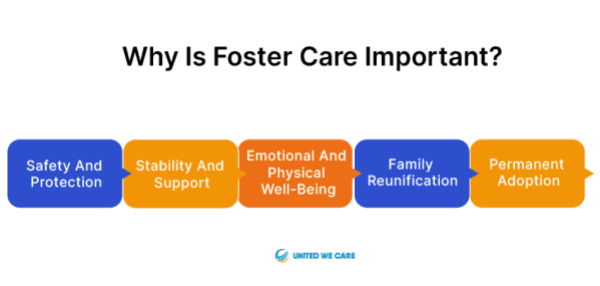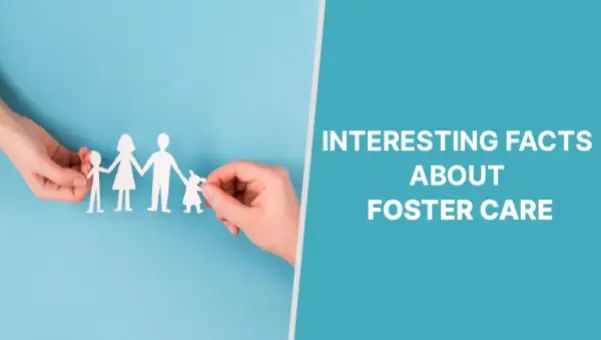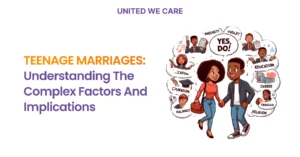Introduction
Foster care provides homes for a brief period of time to children who cannot live with their own families. There can be various reasons for such children to seek a brief setup. Foster homes offer a safe and nurturing environment for the children. Training options teach foster parents to care for the children until they can reunite with their families or be adopted permanently. Foster care aims to protect and support children and improve their mental and emotional well-being.
“I alone cannot change the world, but I can cast a stone across the waters to create many ripples.” – Mother Teresa [1]
What Is Foster Care?
Foster care is a system that provides housing to children for a brief period. Children who require foster homes cannot live with their parents or guardians due to their unavailability, abuse, or neglect. Foster care can be arranged informally, through the courts, or through a social service agency. They provide care and support to the children.
The unstable environment that the children come from can cause mental and emotional concerns. Foster parents get trained to offer these children a safe, stable, loving, and caring environment.
The main motive behind foster care is to reunite the children with their families. If that is not possible, the children can get adopted, which is a permanent solution. Sometimes, foster parents only end up adopting these children [2].
How To Get Started In Foster Care?
The process to get started in foster care is quite simple. It can vary on the location you’re at or the agency you get involved with. Here’s what you can do [3]:

- Research and Gather Information: You can begin by learning about your area’s foster care programs and agencies. Doing so can help you understand the specific requirements and expectations of the agency for future foster parents.
- Contact a Foster Care Agency: You can find a local foster care agency that provides guidance and assistance throughout the fostering process. Do keep in mind to ensure that the agency you choose is licensed. You must communicate freely with the agency and address any questions or concerns in your mind.
- Complete the Application Process: The next step would be to fill out the application forms provided by the agency. They include personal information, background checks, references, and financial disclosures.
- Attend Training and Home Study: Agencies provide pre-service training that you must participate in. These trainings can help you understand the foster care system and child development. During the training, you may learn how to support children with trauma or special needs. A social worker can drop by anytime for a home study, where they will assess if you are suitable to be a foster parent.
- Obtain Required Clearances and Certifications: CPR and First Aid trainings are fundamental. You must ensure you and all family members clear these certifications and background checks.
- Placement and Ongoing Support: Once approved, your agency can work toward matching you with a child or a group of siblings. After that, the agency must provide you with support, training, and resources with everything you might need.
Why Is Foster Care Important?
Millions of children globally are required to stay away from their parents. The foster care system can help them do so [4]:

- Safety and Protection: Children who have faced abuse and neglect at their parents’ hands can find safety and security in foster care. It immediately puts them out of dangerous and unstable homes.
- Stability and Support: Once the children are in foster care, they can start feeling stable and well-supported. This stability can help them return to their schools, providing them a chance for all-round development.
- Emotional and Physical Well-being: Foster care can even help children with their emotional and physical needs. Foster parents are required to provide healthcare, counseling, and education to these children.
- Family Reunification: The main motive of a foster care unit is to provide temporary housing arrangements. Once their family situation has stabilized, foster parents must make the children reunite with their birth parents.
- Permanent Adoption: There might still be children who cannot return to their families as the situation remains unsafe and unstable. In such a situation, foster parents can adopt the children or help find permanent adoptive families.
What Are The Challenges Of Foster Care?
Foster care is about teamwork. However, it does come with its own set of challenges [5]:
- Placement Stability: Often, children have to make multiple moves, jumping from one foster home to another. This frequent move can hamper their sense of security and cause a loss of relationships and education.
- Trauma and Mental Health: Children brought into the foster care system have parents who have caused them trauma and abuse, mentally and physically. Caring for such children can be challenging as they may not trust anyone.
- Support for Foster Parents: Foster parents get assigned children they need to care for. These parents require constant support, training, and guidance on how to help their foster children better.
- Sibling Separation: If a big group of siblings, the system might put them in different foster homes. Sibling separation happens because foster parents and placement options are limited.
- Ransition to Adulthood: Once a foster child turns 18, they must move out and be independent. This transition can cause a lack of stability, employment opportunities, and support systems.
Read this article to get more information about it .
What Is The Difference Between Foster Care And Adoption?
Foster care and adoption aim to care for children who cannot live with their biological parents. Understanding the differences, parents can decide whether they would want to go ahead with a temporary arrangement or seek permanent legal rights for the children[6]:
- Legal Status: Child welfare agencies have legal custody of the child in foster care. In adoption, the legal control is transferred to the adoptive parents permanently.
- Duration: Children come into foster care as a temporary arrangement to later reunite with their own families. In contrast, adoption is a permanent solution for children who cannot return to their families. In the case of adoption, the children become legal members of the family that adopts them.
- Parental Rights: Foster parents do not have any parental rights. They are just to provide care and safety to the foster children. In the case of adoption, the legal rights of biological parents are ended and given permanently to adoptive parents.
- Providing Support: Foster families must support the child and the birth parents. The aim is to help them get reunited. For adoption, adoptive parents must be deeply assessed and prepared for their future life to ensure they are ready and the child is well taken care of.
- Consent: Since birth-parents maintain legal rights, they can consent to which foster family their child should live with. The need to consent can also come through court orders due to child-protection issues. In the case of adoption, biological parents must either willingly or be ordered through court to terminate their rights.
Conclusion
Foster care is a beautiful way of providing children with a healthy and safe environment. Whether you are a first-time foster parent or a new one, there will be multiple challenges that you will face. Choosing a good agency and remembering you are not alone is essential. Foster care provides hope to vulnerable children for a better future in terms of education and independence.
Read this aricle to know more.
If you want more, connect with our expert parenting counselors or explore more content at United We Care! At United We Care, a team of wellness and mental health experts will guide you with the best methods for your well-being.
References
[1] admin, “Teachings of Mother Teresa – Make Me Better,” Make Me Better, Sep. 06, 2021. https://www.makemebetter.net/teachings-of-mother-teresa/
[2] “What is Foster Care | Adopt,” What is Foster Care | Adopt. https://adopt.org/what-foster-care
[3] “Easy Ways to Start a Foster Home (with Pictures) – wikiHow,” wikiHow, May 30, 2022. https://www.wikihow.com/Start-a-Foster-Home
[4] “What Is Foster Care And Why Is It So Important?,” What Is Foster Care And Why Is It So Important? – Camelot Care Centers, Feb. 19, 2021. https://camelotcarecenters.com/2021/03/19/what-is-foster-care-and-why-is-it-so-important/
[5] M. Dozier, “Challenges of foster care,” Attachment & Human Development, vol. 7, no. 1, pp. 27–30, Mar. 2005, doi: 10.1080/14616730500039747.
[6] J. Selwyn and D. Quinton, “Stability, Permanence, Outcomes and Support: Foster Care and Adoption Compared,” Adoption & Fostering, vol. 28, no. 4, pp. 6–15, Dec. 2004, doi: 10.1177/030857590402800403.










